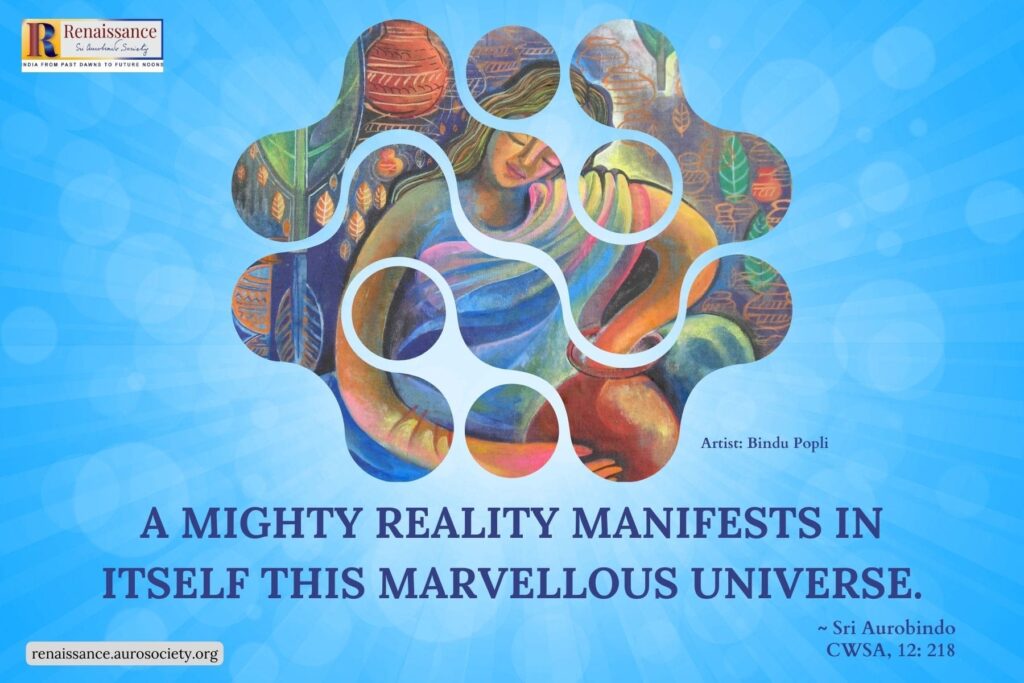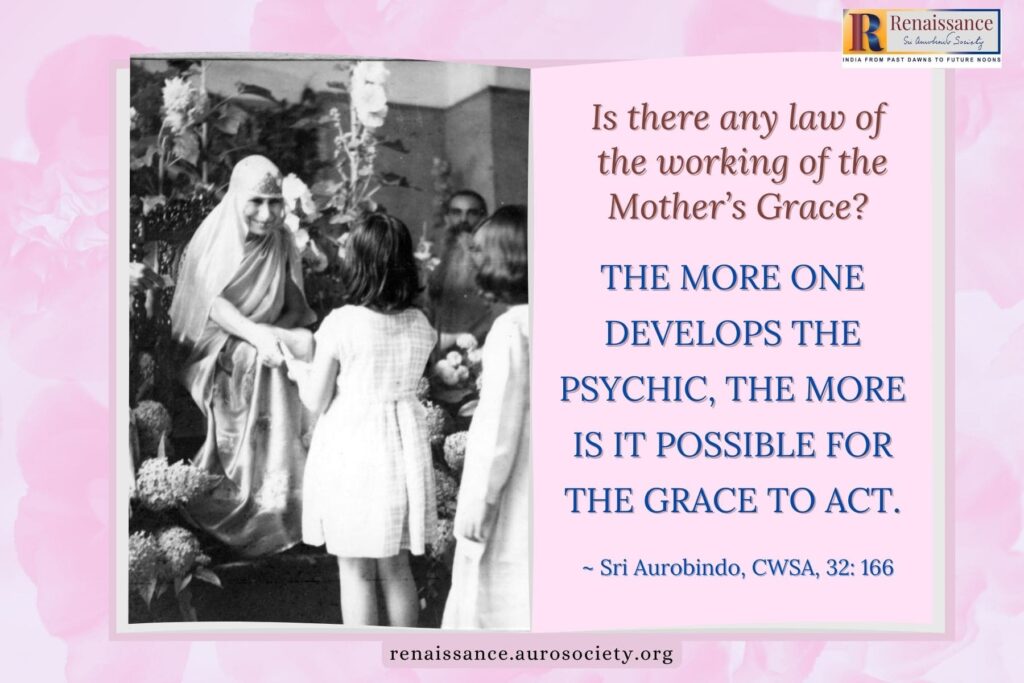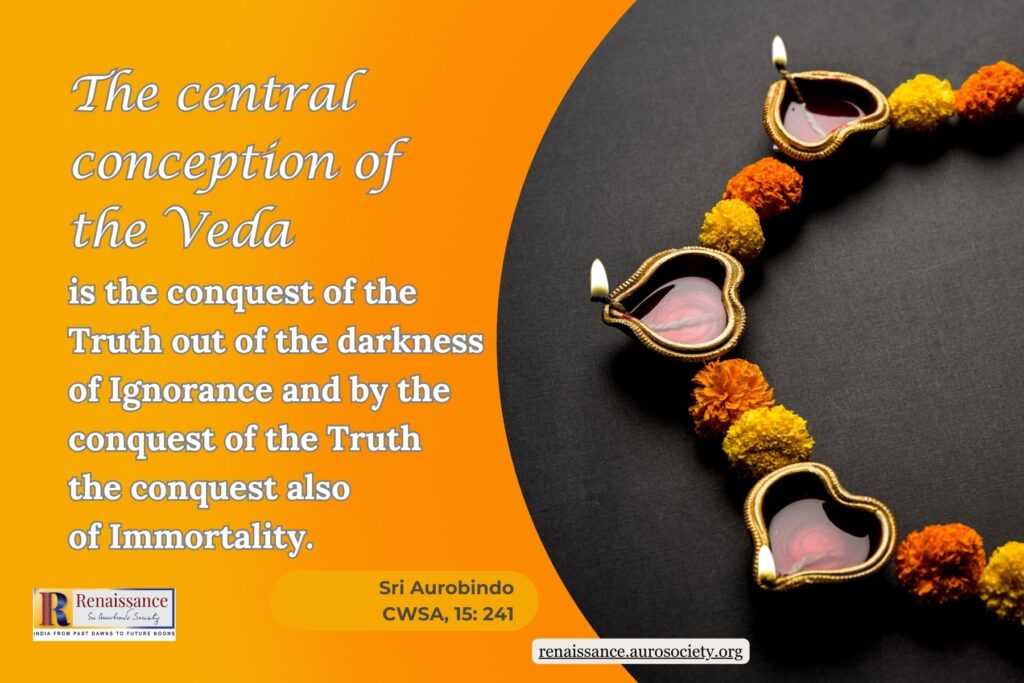Editor’s Note: In these passages, the Mother gives profound explanations on the real inner meaning and significance of choice and freedom in a life guided by seeking for the Truth.

Three Passages from the Mother
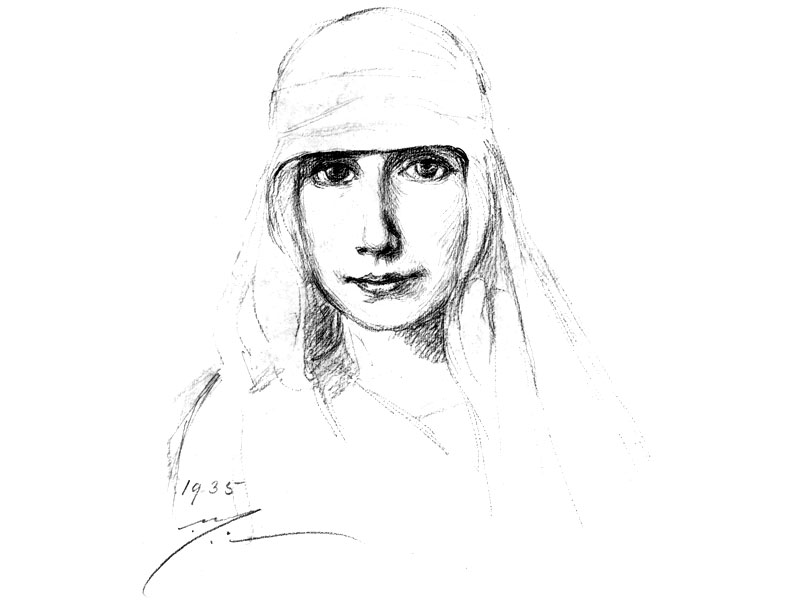
Free Choice and Inner Value of Things
Things have an inner value and become real to you only when you have acquired them by the exercise of your free choice, not when they have been imposed upon you. If you want to be sure of your religion, you must choose it; if you want to be sure of your country, you must choose it; if you want to be sure of your family, even that you must choose. If you accept without question what has been given you by Chance, you can never be sure whether it is good or bad for you, whether it is the true thing for your life.
Step back from all that forms your natural environment or inheritance, made up and forced upon you by Nature’s blind mechanical process; draw within and look quietly and dispassionately at things. Appraise them, choose freely. Then you can say with an inner truth, “This is my family, this my country, this my religion.”
If we go a little way within ourselves, we shall discover that there is in each of us a consciousness that has been living throughout the ages and manifesting in a multitude of forms. Each of us has been born in many different countries, belonged to many different nations, followed many different religions.
Why must we accept the last one as the best? The experiences gathered by us in all these many lives in different countries and varying religions, are stored up in that inner continuity of our consciousness which persists through all births. There are multiple personalities there created by these past experiences, and when we become aware of this multitude within us, it becomes impossible to speak of one particular form of truth as the only truth, one country as our only country, one religion as the only true religion.
There are people who have been born into one country, although the leading elements of their consciousness obviously belong to another. I have met some born in Europe who were evidently Indians; I have met others born in Indian bodies who were as evidently Europeans. In Japan I have met some who were Indian, others who were European. And if any of them goes to the country or enters into the civilisation to which he has affinity, he finds himself there perfectly at home.
If your aim is to be free, in the freedom of the Spirit, you must get rid of all the ties that are not the inner truth of your being, but come from subconscious habits. If you wish to consecrate yourself entirely, absolutely and exclusively to the Divine, you must do it in all completeness; you must not leave bits of yourself tied here and there. You may object that it is not easy to cut away altogether from one’s moorings.
But have you never looked back and observed the changes that have taken place in you in the course of a few years? When you do that, almost always you ask yourself how it was that you could have felt in the way you felt and acted as you did act in certain circumstances; at times, even, you can no longer recognise yourself in the person you were only ten years ago. How can you then bind yourself to what was or to what is or how can you fix beforehand what may or may not be in the future?
All your relations must be newly built upon an inner freedom of choice. The traditions in which you live or are brought up have been imposed on you by the pressure of the environment or by the general mind or by the choice of others. There is an element of compulsion in your acquiescence.
Religion itself has been imposed on men; it is often supported by a suggestion of religious fear or by some spiritual or other menace. There can be no such imposition in your relation with the Divine; it must be free, your own mind’s and heart’s choice, taken up with enthusiasm and joy. What union can that be in which one trembles and says, “I am compelled, I cannot do otherwise”?…
When you come to the Yoga, you must be ready to have all your mental buildings and all your vital scaffoldings shattered to pieces. You must be prepared to be suspended in the air with nothing to support you except your faith. You will have to forget your past self and its clingings altogether, to pluck it out of your consciousness and be born anew, free from every kind of bondage.
Think not of what you were, but of what you aspire to be; be altogether in what you want to realise. Turn from your dead past and look straight towards the future. Your religion, country, family lie there; it is the DIVINE.
(The Mother, CWM, Vol. 3, pp. 81-84)
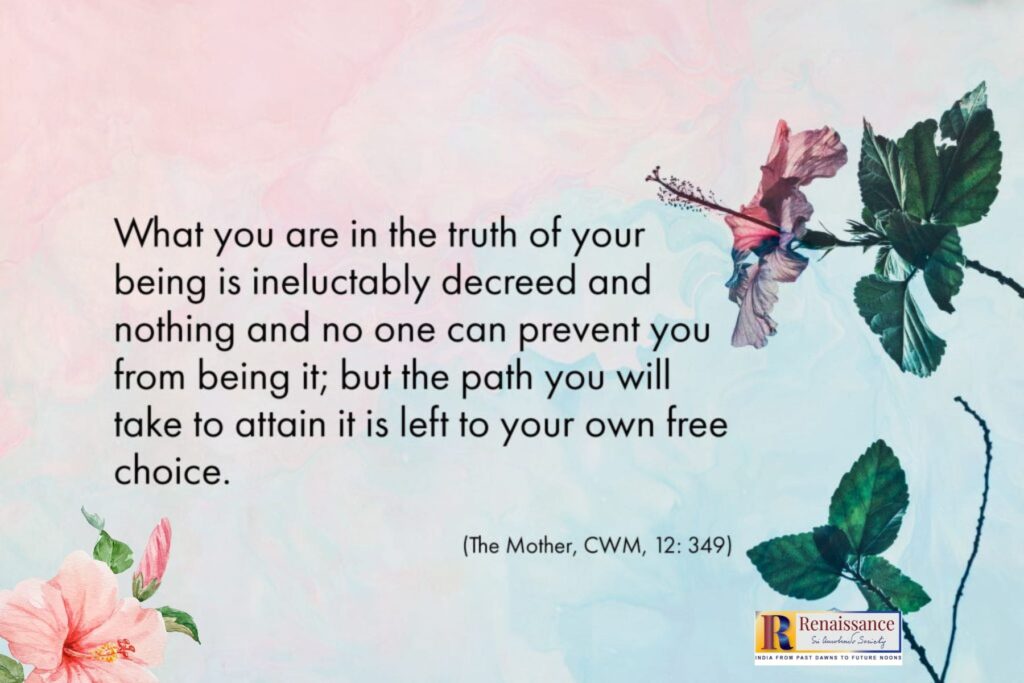
* * *
What does “choose one’s family” mean?
The Mother: You have come into the world in a certain milieu, among certain people. When you are quite young, but for a few rare exceptions, what surrounds you seems altogether natural to you, because you are born in its midst and are quite used to it.
But when, a little later, a spiritual aspiration wakes up in you, you may quite possibly feel yourself completely ill at ease in the environment where you have lived, if, for instance, the people who have brought you up don’t have the same aspiration or if their ideas are the very opposite of what is developing in you.
Instead of saying, “You see, I belong to this family, what shall I do? I have a mother, a father, brothers, sisters…”, you can set out in search (I don’t mean necessarily travel), set out in search of spirits who have an affinity with yours, people who have a similar aspiration and, if you have the sincere aspiration to find those who like you are in quest of something, you will always have the occasion to meet them in one way or another, through quite unexpected circumstances; and when you have found one or more people who are in exactly the same state of mind and have the same aspiration, quite naturally there will be created bonds of closeness, intimacy, friendship and, among you, you will form a kind of brotherhood, that is to say, a true family.
You are together because you are close to one another, you are together because you have the same aspiration, you are together because you want to create the same goal in life; you understand one another when you speak, you have no need to discuss anything which is said and you live in a kind of inner harmony. This is the true family, this is the family of aspiration, the family of spiritual inclinations.
Now, about the country, this may depend upon all sorts of things, this may depend upon a sort of inner affinity. For instance, if you come to a country and there you find a kind of response, an inner response to your aspiration, you find the surroundings more in conformity with your tastes, your tendencies, you may very well choose to live in this country, which is not necessarily that of your birth; and since you choose that country to live there, you may say, “This is my country.”
There are people, many people who go and settle elsewhere for very materialistic and uninteresting reasons most of the time, but there are also others who are in search of an environment which suits their inner taste, their aspiration, or who seek lands, ways of living more in keeping with their deeper nature; then they settle down somewhere and don’t move again, and when they stay there for a number of years, they can really feel that this country is theirs, much more than the house or village or city where they were born.
(The Mother, CWM, Vol. 4, pp. 258-260)
* * *
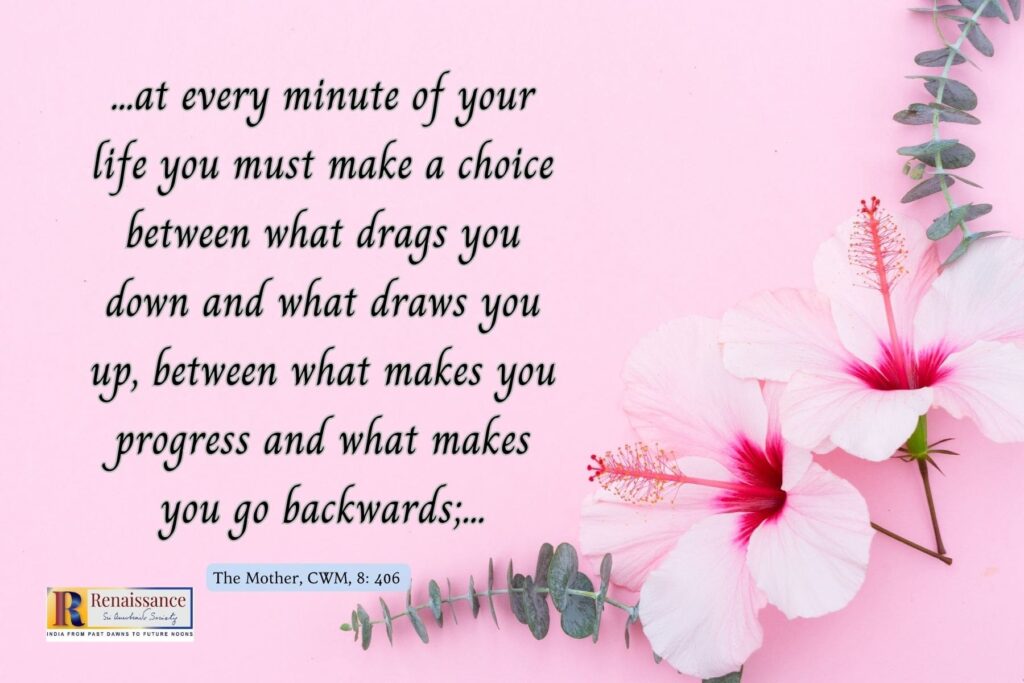
* * *
On Preference and Choice: “At every minute one has to choose”
You must be in a perpetual state of choice; at every minute of your life you must make a choice between what drags you down and what draws you up, between what makes you progress and what makes you go backwards… at every second the choice is before you, and you may take a step downward or a step upward, take a step backward or a step forward; and this state of choice must be constant, perpetual, you must never fall asleep.
But this is not what I call having preferences.
Preferences—this means precisely not choosing. There is something for which you feel sympathy or antipathy, repulsion or attraction, and blindly, without any reason, you become attached to this thing; or else, when you have a problem to solve, you prefer the solution of this problem or this difficulty to be of one particular kind or another.
But that is not at all choosing—don’t you see, what the truest thing is doesn’t come into question, it is a matter of having a preference.
For me the meaning of the word is very clear: a preference is something blind, an impulse, an attachment, an unconscious movement which is usually terribly obstinate.
You are placed in certain circumstances; one thing or another may happen, and you yourself have an aspiration, you ask to be guided, but within you there is something which prefers the answer to be of a certain kind, the indication to be a particular one, or the event to come about in one way rather than another; but all this is not a question of choice, it is a preference.
And when the answer to your aspiration or prayer is not in accord with your desire, this preference makes you feel unhappy, you find it difficult to accept the answer, you must fight to accept it; whereas if you had no preferences, whatever the answer to your aspiration, when it comes, you cling to it joyfully, spontaneously with a sincere élan. Otherwise you are compelled to make an effort to accept what comes, the decision which comes in answer to your aspiration; you wish, desire, prefer things to be like this and not like that.
But that, indeed, is not a choice.
The choice is there at every minute; every minute you are faced with a choice: the choice to climb up or go down, the choice to progress or go backwards. But this choice does not imply that you prefer things to be like this or like that; it is a fact of every moment, an attitude you take.
Choice means a decision and an action. Preference is a desire.
A choice is made and ought to be made, and if it is truly a choice, it is made without care for the consequences, without expecting any result. You choose; you choose according to your inner truth, your highest consciousness; whatever happens does not touch you, you have made your choice, the true choice, and what comes about is not your concern.
While, on the contrary, if you have preferences, you will choose through preference in one way or another, your preference will distort your choice: it will be calculation, bargaining, you will act with the idea that a particular thing must happen because this is what you prefer and not because that is the truth, the right thing to do.
Preference is attached to the result, acts with a view to the result, wishes things to be in a particular way and acts to bring about its wish; and so this opens the door to all kinds of things. Choice is independent of the result. And certainly, at every minute you can choose, you are faced with the necessity of choosing at every second. And you do not choose really well, in all sincerity, unless it is the truth of the choice which interests you, and not the result of your choice. If you choose with the result in view, that falsifies your choice.
(The Mother, CWM, 8: 405-407)
~ Design: Rishabh Sharma and Beloo Mehra

